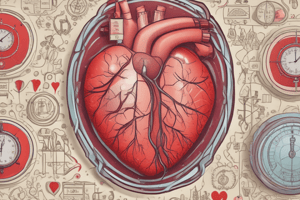Podcast
Questions and Answers
What is the primary characteristic of primary hypertension?
What is the primary characteristic of primary hypertension?
- It always requires immediate medical intervention.
- It is caused by an identifiable medical condition.
- It is chronic hypertension with no identifiable cause. (correct)
- It includes symptoms such as severe headache and chest pain.
Which of the following medications is NOT typically used as a first-line treatment for primary hypertension?
Which of the following medications is NOT typically used as a first-line treatment for primary hypertension?
- Beta-blockers (correct)
- Calcium channel blockers
- ACE inhibitors
- Thiazide diuretics
What distinguishes secondary hypertension from primary hypertension?
What distinguishes secondary hypertension from primary hypertension?
- It is caused by an underlying medical condition. (correct)
- It is diagnosed solely through BP readings.
- Secondary hypertension has no associated risk factors.
- It is always asymptomatic.
What constitutes a hypertensive emergency?
What constitutes a hypertensive emergency?
Which of the following is a common symptom associated with hypertensive emergencies?
Which of the following is a common symptom associated with hypertensive emergencies?
Flashcards
Hypertension definition
Hypertension definition
High blood pressure, typically a reading of 130/80 or higher.
Hypertensive urgency
Hypertensive urgency
High blood pressure (SBP ≥180 and/or DBP ≥120) WITHOUT immediate end-organ damage.
Primary hypertension cause
Primary hypertension cause
High blood pressure with no known underlying cause.
Secondary hypertension cause
Secondary hypertension cause
Signup and view all the flashcards
Hypertensive Emergency
Hypertensive Emergency
Signup and view all the flashcards
Study Notes
Hypertension
- Symptoms: Often absent; severe cases may present with headache, dizziness, or visual disturbances.
- Diagnosis: Blood pressure (BP) ≥130/80 mmHg (confirmed on multiple readings); assess for end-organ damage.
- Treatment: Lifestyle changes (DASH diet, exercise, salt reduction); medications (ACE inhibitors, ARBs, CCBs, thiazide diuretics).
Primary Hypertension
- Definition: Chronic hypertension with no identifiable cause (essential hypertension).
- Risk Factors: Age, family history, obesity, sedentary lifestyle, high sodium intake.
- Symptoms: Asymptomatic unless severe.
- Diagnosis: Clinical diagnosis of exclusion.
- Treatment: Lifestyle changes, first-line medications (ACE inhibitors, ARBs, CCBs, thiazide diuretics).
Secondary Hypertension
- Definition: Hypertension caused by an underlying condition.
- Causes: Renovascular disease, endocrine disorders (pheochromocytoma, Cushing's syndrome, hyperaldosteronism), obstructive sleep apnea, coarctation of the aorta.
- Symptoms: Often resistant hypertension; may exhibit features of the underlying condition.
- Diagnosis: Workup for secondary causes (renal ultrasound, endocrine testing).
- Treatment: Treat the underlying cause; manage BP with appropriate medications.
Hypertensive Emergencies
- Definition: Severe hypertension (systolic BP ≥180 mmHg and/or diastolic BP ≥120 mmHg) with acute end-organ damage.
- Symptoms: Headache, chest pain, dyspnea, neurological deficits (stroke, encephalopathy), visual disturbances.
- Diagnosis: Blood pressure measurement; evidence of end-organ damage (labs, imaging).
- Treatment: Intravenous antihypertensives (labetalol, nitroprusside, nicardipine) to gradually lower BP over 24-48 hours to prevent ischemia.
Hypotension (Separate topic)
- Definition: Low blood pressure.
- (The provided text does not offer details on hypotension itself, so no further information is summarized regarding it.)*
Studying That Suits You
Use AI to generate personalized quizzes and flashcards to suit your learning preferences.




